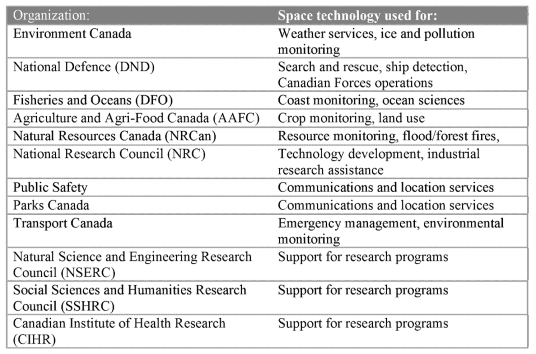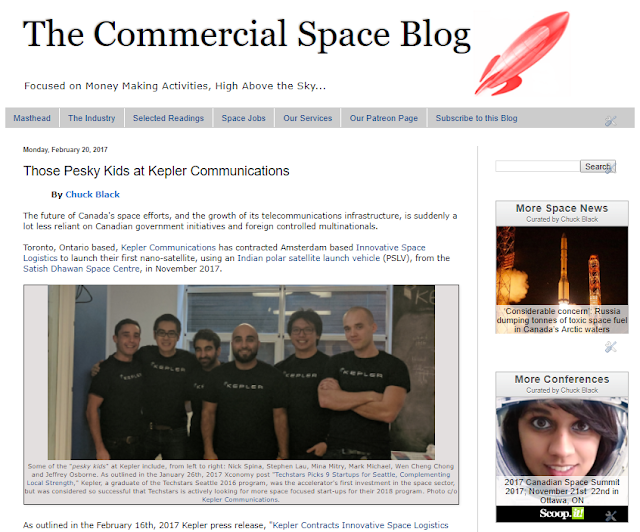By Chuck Black
Want to get to space? According to the preamble of a recently released Canadian Space Agency (CSA) funded report, entrepreneurs and the government can leverage the existing Canadian innovation support infrastructure "in a way that supports the growth of space sector companies without incurring the overhead of building new operations."
That's the core message of the eighty-five page "Study on Concepts and Business Models for a Network of Incubators Supporting Space Activities Final Report on the Canadian Space Innovation Network," more commonly known as the "Doyletech Report."
The name comes from the Doyletech Corporation, the firm which delivered the report to the CSA in March 2017. The complete document (minus appendixes and cost estimates) was released to this blog via a Federal Access to Information (ATI) request in September 2017.
As explained in its executive summary, the Doyletech Report outlines the case for leveraging existing and disparate Canadian capabilities by creating what it calls a "Canadian Space Innovation Network" (CSIN). According to the report:
The report also outlined a set of preliminary policy objectives for the program. These included:
Want to get to space? According to the preamble of a recently released Canadian Space Agency (CSA) funded report, entrepreneurs and the government can leverage the existing Canadian innovation support infrastructure "in a way that supports the growth of space sector companies without incurring the overhead of building new operations."
 |
| The front cover and preamble of the March 2017 Doyletech Report. It was written by Doyletech managing partner Glenn McDougall, "entrepreneur in residence" Neil Knudsen and senior consultant Keith Belinko under contract to the CSA. According to McDougall, "the Canadian Space Agency has played a pivotal role on the research, engagement and articulation of the CSIN incubation and acceleration model." For the complete public report (minus redactions), simply click on the graphic above. Graphic c/o CSA & Doyletech. |
That's the core message of the eighty-five page "Study on Concepts and Business Models for a Network of Incubators Supporting Space Activities Final Report on the Canadian Space Innovation Network," more commonly known as the "Doyletech Report."
The name comes from the Doyletech Corporation, the firm which delivered the report to the CSA in March 2017. The complete document (minus appendixes and cost estimates) was released to this blog via a Federal Access to Information (ATI) request in September 2017.
As explained in its executive summary, the Doyletech Report outlines the case for leveraging existing and disparate Canadian capabilities by creating what it calls a "Canadian Space Innovation Network" (CSIN). According to the report:
the CSIN will advance Canada's Innovation Agenda (now called "Canada's Innovation and Skills Plan") by focusing on the people, technologies technologies and companies in the Canadian space sector who provide benefits to Canada (emphasis included with the original document).
These technologies are felt in such wide ranging commercial sectors as entertainment, transport, telecommunications and resource management.
Canadians also benefit from space through the myriad government departments that utilize space technologies in the course of their day to day operations.
 |
| Federal government departments which either support or fund space based assets in order to support their core mandate. Graphic c/o CSA & Doyletech. |
The Doyletech Report strongly suggests that Canada is capable of generating world class and important space activities by utilizing a variety of already existing, domestic tools.
The plan is "modeled on similar entities supported by the UK Space Agency and the European Space Agency (ESA)," but does not simply create new facilities.
"It's a made in Canada solution," explained Neil Knudsen, one of the co-authors of the report in a interview late last week. "It's a scalable model that acknowledges that business is business, whether or not we're conducting it on the ground or in space."
According to co-author Glenn McDougall "We tried to keep away from the bricks and mortar solutions advocated in the UK, the US and the European Union (EU) where a physical HQ is required to coordinate and manage activities of the network."
"Wherever possible, we tried to take advantage of existing facilities," he said.
"Wherever possible, we tried to take advantage of existing facilities," he said.
 |
| A strengths, weaknesses, opportunities, and threats (SWOT) analysis of the CSIN, from the Doyletech report. It's worth noting that, although the SWOT analysis specifically mentions "funding" as a concern in two of the four quadrants of the analysis, the specific amounts needed to fund the CSIN have been redacted from the released report. Graphic c/o CSA & Doyletech. |
The report focused on four already in existence, Canadian based start-up assistance organizations (SAO's) and the services they provide. These were the Kitchener-Waterloo, ON based Communitech; the Ottawa, ON based Invest Ottawa, the Montreal PQ based District 3 Innovation Centre and the Edmonton, AB based health technology incubator TEC Edmonton.
The report also assessed the network of ESA Business Incubation Centers and the UK Space Incubator Network in order to come up with a listing of key services needing to be delivered by the proposed CSIN.
Those key services included:
The report also assessed the network of ESA Business Incubation Centers and the UK Space Incubator Network in order to come up with a listing of key services needing to be delivered by the proposed CSIN.
Those key services included:
- Networking opportunities - This was the most common request. According to the report, "while the space sector in Canada is small, knowledge among those participants of what other players are doing is very weak."
- Access to specialized equipment - The second most requested service.
- Access to advisers who understand the space industry and "product design certification."
- Business support and financing.
- Access to information related to intellectual property and contract services.
The report mostly glossed over the role of the CSA, in favor of focusing on the role the CSIN could provide by supporting entrepreneurs and start-up space companies.
Specific space missions and partnerships would be left up to individual entrepreneurs to develop as they see fit. Some entrepreneurs could even bypass the traditional space community as represented by the CSA in order to work with other facilitators, an option unheard of just a few years ago.
 |
| At the core of the Doyletech report is a simple acceptance of the obvious. We live in a world where space focused companies sell products and services to more than their national space agencies. As outlined in the February 20th, 2017 post, "Those Pesky Kids at Kepler Communications," there are already Canadian based space companies which have chosen a different path. Graphic c/o Commercial Space blog. |
The report also outlined a set of preliminary policy objectives for the program. These included:
- Raising awareness of the market opportunities for space technology.
- Encouraging the launch of new start-ups in the sector.
- Fostering collaboration between large multinational enterprises (LNE's), who possess the funding, access to markets and space specific resources, and small-medium enterprises (SME) who "have the technical resources and organizational dexterity to develop and experiment with new applications and processes."
- Ensuring the sector possesses the required skills.
- Making greater use of the existing infrastructure to support SME's.
The report reaches a number of the same conclusions as we have in our research. Primarily that there's no need for a standalone, bricks and mortar space-accelerator.
Rather, Canada is best served by an organization that provides a layer on top of the existing accelerator ecosystem to provide guidance in areas that are unique to space.
Where we differ is that Satellite Canada places greater emphasis on the technical issues - we think that access to specialized equipment and facilities will have a greater impact on the success of Canadian space SMEs.
The report reflects this as well, mentioning that access to specialized equipment "was clearly the second most requested service."As outlined in the August 3rd, 2017 post, "Satellite Canada Applies for Innovation SuperCluster Funds," Anderson and his team have already applied for Federal matching funds under the Justin Trudeau government's new $950Mln CDN Innovation Superclusters Initiative to build a very similar sort of program to what the Doyletech Report has proposed.
As for Doyletech, "I can't say what the next steps are," said McDougall. "We've outlined a good model. It's up to the government to decide what to do next."
Maybe that's true today. But the Doyletech Report suggests that high level, centralized decision making doesn't necessarily need to be a requirement for tomorrow.


nice
ReplyDelete